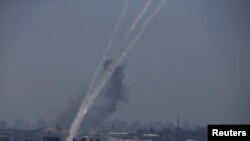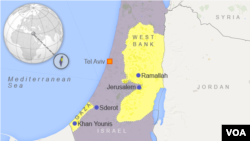President Barack Obama has told Israeli Prime Minister Benjamin Netanyahu that the United States is prepared to mediate an end to the violence with Palestinians including a return to the 2012 ceasefire.
The president spoke to Netanyahu by telephone Thursday, another deadly day in the Mideast.
The White House says Obama reaffirmed Israel's right to defend itself from rocket attacks by Hamas militants. But he said he is concerned the violence could escalate and that all sides must do all they can to protect the lives of civilians.
United Nations chief Ban Ki-moon called Thursday for an immediate ceasefire in the Israeli conflict with Hamas militants in Gaza, but neither of the warring sides showed any hint of stopping its attacks.
The UN secretary-general told an emergency meeting of the Security Council that Israel and Hamas "must exercise maximum restraint" to end the fighting.
As Israeli warplanes relentlessly attacked hundreds of Hamas targets in Gaza for a third day, Prime Minister Benjamin Netanyahu told a parliamentary committee that a cease-fire is "not even on the agenda."
Hamas continued to fire rockets at the key Israeli cities of Tel Aviv and Jerusalem, although the Jewish state said its Iron Dome missile defense system has knocked down most of them.
Israel has reported no casualties, while Palestinian officials said the death toll in Gaza from the Israeli assault has reached at least 85 militants and civilians, including women and children.
Israel's military said it struck more than 300 targets overnight and has hit at least 750 since Tuesday.
"We are facing long days of fighting and Hamas attempts to surprise Israeli with attacks from the air, sea and land," Israeli Defense Minister Moshe Yaalon said Thursday of the offensive. It began after a buildup of violence following the killings of three Jewish students last month and the murder of a Palestinian teen in a suspected revenge attack.
American response
The United States is trying to stem the violence in a way that allows the Jewish state to continue defending itself from Hamas rocket fire, Secretary of State John Kerry said on Thursday.
Kerry, in Beijing for a summit with Chinese leaders, said it's a "dangerous moment" for the Mideast.
Hundreds of rockets have been fired from Gaza since the teens' slayings.
Kerry said no country can accept such rocket attacks, adding that de-escalating the crisis is ultimately in everyone's interests.
Kerry said he has spoken with Israel Prime Minister Benjamin Netanyahu and Palestinian President Mahmoud Abbas to see if there is some way to restore peace.
Hamas attacks
Hamas spokesman Mushir Al Masri vowed the group would keep on fighting and strike at Israel from the land, sea and air.
Rockets from Gaza have struck parts of central and southern Israel, disrupting the lives of people there but so far causing no serious casualties.
The military said Israel's Iron Dome intercepted at least one rocket Thursday over Tel Aviv, Israel's second-largest city, located about 60 kilometers north of Gaza. The system also intercepted another rocket just east of the Palestinian territory.
Overall, Israel's Iron Dome interceptor has shot down some 90 percent of Palestinian rockets during this week's surge of Gaza fighting, up from the 85 percent rate in the previous miniwar of 2012, Israeli and U.S. officials said Thursday.
United Nations emergency session
Ahead of the Security Council meeting, Ban condemned the rocket attacks and called the surge in violence "one of the most critical tests the region has faced in years."
"Gaza is on a knife-edge. The deteriorating situation is leading to a downward spiral which could quickly get beyond anyone’s control," he said. "The risk of violence expanding further still is real. Gaza, and the region as a whole, cannot afford any other full-blown war."
He condemned the rocket attacks from Gaza and expressed concern about the number of civilians killed by Israeli airstrikes.
Bombings
Across the Gaza Strip, plumes of smoke and rubble marked the aftermath of Israeli attacks in the most serious outbreak of hostilities between Palestinian militants and Israel's powerful armed forces in two years.
“The Jews say they are fighting Hamas and fighting gunmen, while all the bodies we have seen on television are those of women and children,” said Khaled Ali, 45, a Gaza taxi driver.
Israel accuses Hamas Islamists of deliberately putting innocent Palestinians in harm's way by placing weaponry and gunmen in residential areas.
Netanyahu, in a statement Wednesday, said Hamas was committing "a double war crime. ... It targets Israeli civilians, while hiding behind Palestinian civilians," he said.
The military said the airstrikes have targeted and destroyed tunnel networks, rocket-launching sites and the homes of Hamas commanders.
As the number of victims in Gaza rose, Egypt opened the Rafah border crossing, with hospitals in north Sinai placed on standby to receive the wounded, Egypt's official MENA news agency reported, according to the French news agency AFP.
Israeli leaders, who have popular support for the Gaza offensive, have also warned the air offensive could be expanded into a ground invasion of one of the world's most densely populated territories.
About 20,000 reservists have been mobilized, the military said.
Robert Berger contributed to this report from Jerusalem. Some information for this report provided by Reuters, AFP and AP.






